Most of us like meatballs. These balls of meat are tender and juicy, as well as flavorful. Aside from that, they are very versatile, as you can serve them with various dishes, including yogurt sauce, gravy, tomato sauce, and so on.
But did you know that one of their main ingredients is actually eggs? Yes, eggs make them moist and juicy and protect them from falling apart during cooking.
One may therefore say that eggs are irreplaceable when making meatballs. Fortunately, if you don’t have any, suffer from an egg allergy, or just dont like them, there are some ingredients that have similar capabilities and can successfully substitute them.
So let’s take a look at the list of best egg substitutes for meatballs.
1. Mashed Potatoes
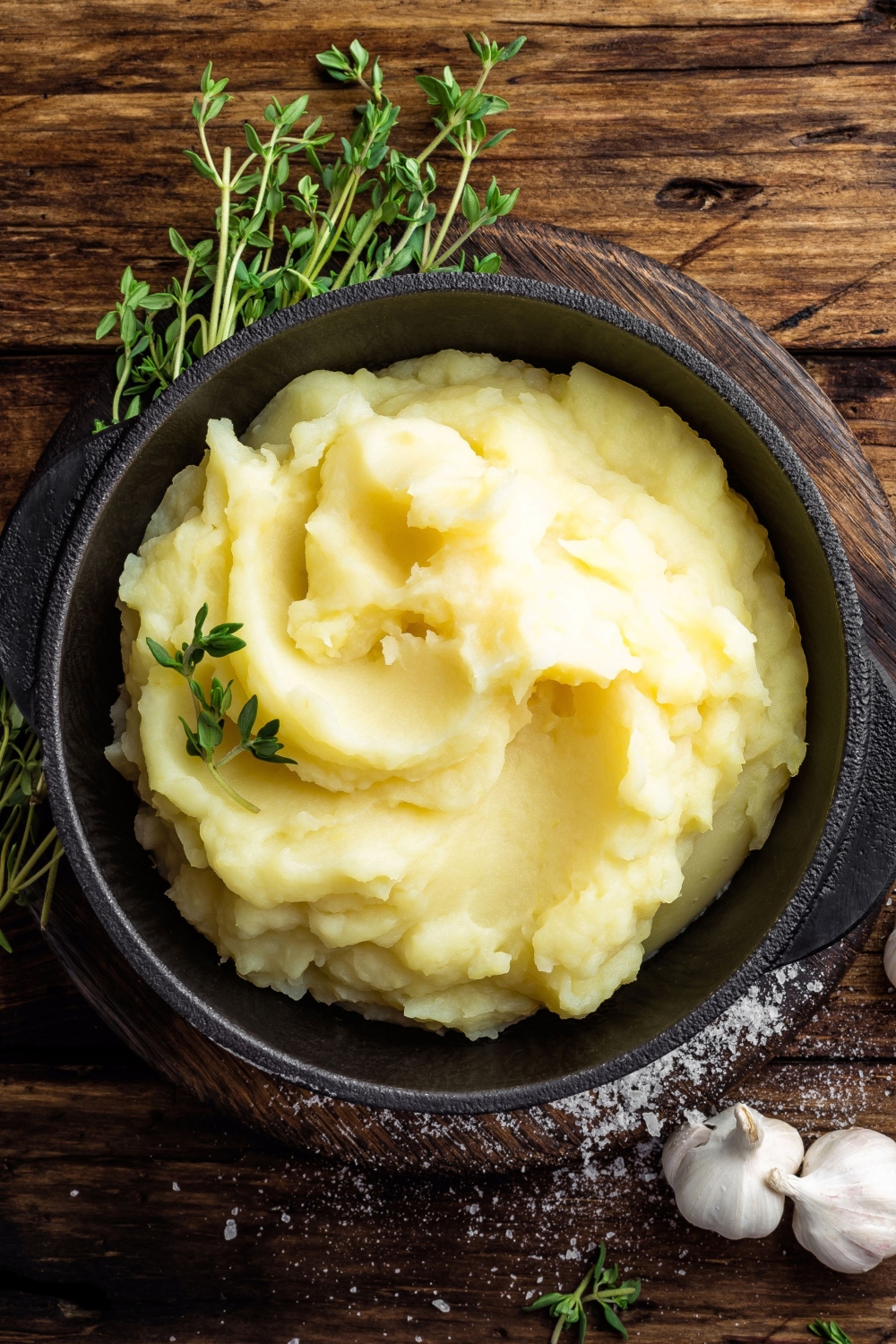
Mashed potatoes are a popular dish made by boiling potatoes until they are soft and then mashing them into a creamy consistency. Aside from enjoying them on their own, they can also be used as a binding agent, in this case, in meatballs.
Pros:
• Mashed potatoes can be a suitable alternative for those of you with egg allergies.
• Similar to eggs, mashed potatoes can provide moisture and help the meatball mixture stick together.
• Also, if you follow a vegan diet, you can use mashed potatoes instead of eggs, as they are vegan-friendly.
Cons:
• While mashed potatoes can add their own flavor to the meatball mixture, they may also change the taste profile of the meatballs. If you prefer the traditional meatball flavor, using mashed potatoes as an egg substitute may not be the best option.
• The mashed potatoes can make the meatballs softer and potentially more delicate, which could affect their shape and texture when cooked.
• Meatballs made with mashed potatoes might require slightly longer cooking times compared to those made with eggs.
How To Use As A Substitute:
First, make a batch of mashed potatoes. After you make them, allow them to cool slightly before using them in the meatball mixture.
When mashed potatoes are cooled, use your hands or a spoon to thoroughly mix the meatball ingredients, incorporating the mashed potatoes evenly.
Take note that you have to use ¼ cup of meatballs for every egg. This should do the job well.
2. Plain Yogurt
Plain yogurt is a milk product that most of us have at home, at least one bottle. So, if you are not planning to eat it for breakfast, you can use it in meatballs instead of eggs.
I have to say that plain yogurt is also a great egg substitute in brownies because of similar reasons.
Pros:
• Plain yogurt can add moisture to the meatball mixture, which can help prevent the meatballs from drying out during cooking. This can result in juicier and more tender meatballs.
• The creamy texture of plain yogurt can contribute to the overall texture of the meatballs, making them softer and potentially more delicate.
• Plain yogurt can enhance the overall taste of your meatballs and provide a unique twist to the traditional meatball flavor.
Cons:
• While plain yogurt can enhance the flavor of meatballs, it may also change it. The tanginess and slight acidity of the yogurt may not complement the flavor of meatballs as well as eggs do.
• Just like mashed potatoes, the yogurt can make the meatballs softer, which could affect their shape and texture when cooked.
• Plain yogurt can make the meatballs more sour, which is not preferable to some people.
How To Use As A Substitute:
Although the exact ratio will vary depending on the specific recipe, the general rule of thumb is to use 3 cups of plain yogurt instead of one egg.
So, once you mix all the ingredients (the beef or pork, breadcrumbs, minced onions, garlic, herbs, spices, salt, and pepper), instead of adding eggs, incorporate plain yogurt into the mixture.
Start by adding the recommended substitution ratio and adjust as needed to achieve the desired consistency. Mix the ingredients together until well combined, shape the meatballs, and cook them.
3. Tomato Paste
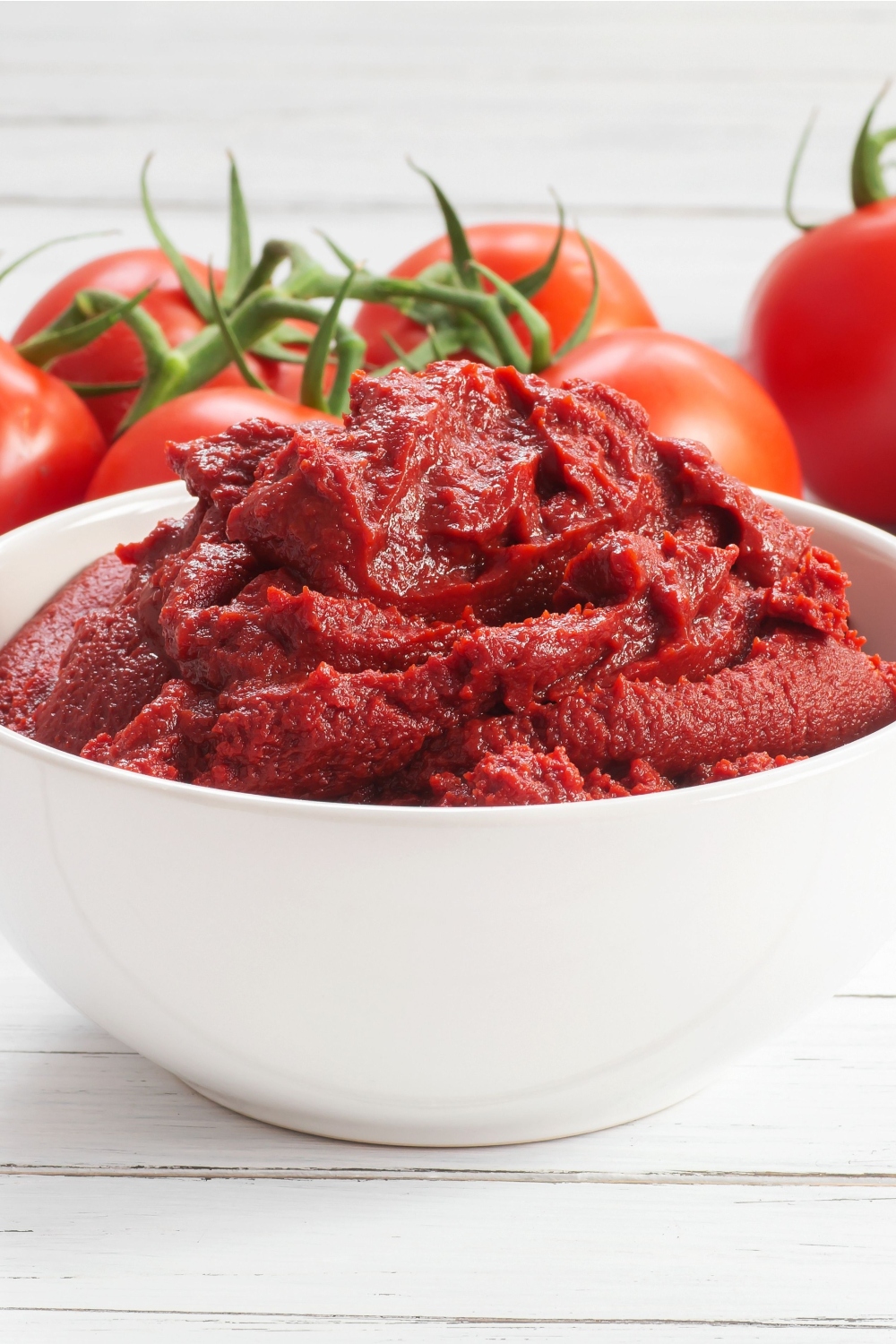
This thick paste made from tomatoes has so many uses in the cooking world and one of them is as a binding agent. Because of that, it can be used as an egg substitute for meatballs.
Pros:
• Tomato sauce can add moisture to the meatball mixture, helping to prevent the meatballs from becoming dry during cooking.
• Tomato sauce can serve as a binding agent, holding the meatball mixture together.
• Tomato sauce is readily available in most kitchens and you can also easily find it at many grocery stores and supermarkets.
Cons:
• If you use a very acidic sauce (like a sauce with lemon), the taste can be overpowering.
• Also, tomato sauce can be very thick, which can alter the overall texture and consistency of the meatballs.
• In some cases, the tomato flavor may be too pronounced for the traditional meatballs made with eggs.
How To Use As A Substitute:
If you are making Italian-style meatballs, this substitute may work especially well. All you have to do is to use 2 tablespoons of tomato paste instead of one egg.
If you are worried about the thick consistency, you can also add a bit of water to the mixture to make it thinner.
4. Flax Seeds
These small, flat, oval-shaped seeds, known as flaxseeds, have been cultivated for thousands of years, mostly for nutritional and medicinal properties. However, they can also be used in many culinary endeavors, including making meatballs.
Pros:
• Flax seeds are an excellent egg substitute for those of you with egg allergies or following a vegan diet.
• Flax seeds are a nutrient powerhouse, as they are a rich source of omega-3 fatty acids, dietary fiber, and protein, as well as many antioxidants.
• Flax seeds add a mild, nutty flavor to the meatballs, enhancing the taste and providing a slightly different, enjoyable culinary experience.
Cons:
• While flaxseed meal can provide some binding in meatballs, it might not match the exact texture and moisture retention that eggs offer.
• The nutty flavor of flax seeds may not be preferred by everyone or might not complement certain meatball recipes.
• Depending on your location, flax seeds might be less readily available or more expensive than eggs.
How To Use As A Substitute:
Before you do anything in terms of making meatballs, you first need to make a “flax seed egg”. In order to do that, you must combine 1 tablespoon of ground flax seeds with 3 tablespoons of water.
Let the mixture sit for about 5 to 10 minutes in order for it to thicken and develop a gel-like consistency that will act as a bidding ingredient.
Once the “flax seed egg” is ready, simply use it to replace one regular egg in your meatball recipe.
5. Chia Seeds
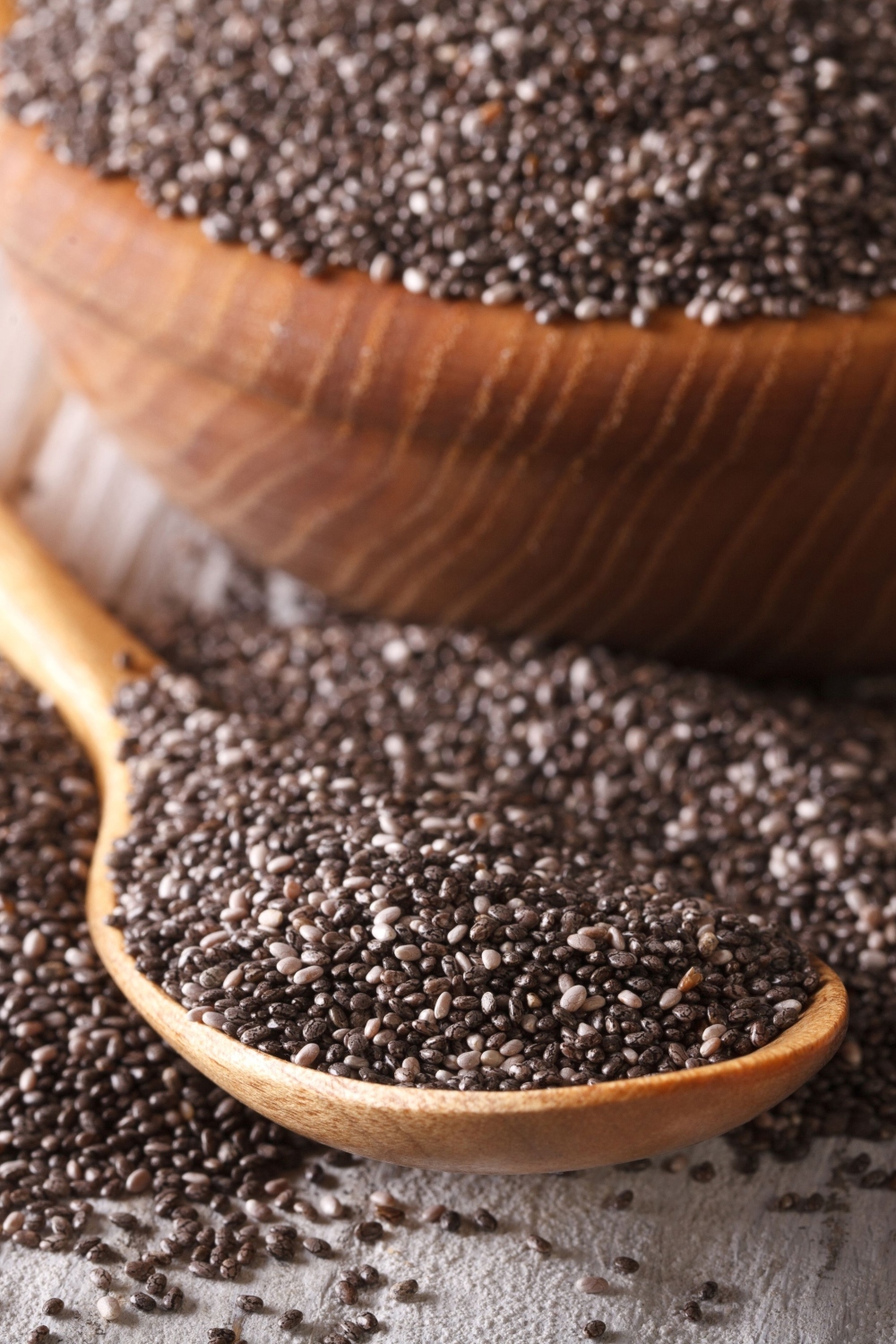
Another small, oval-shaped seed with powerful health benefits, chia seeds can also be used as an ingredient in meatballs. And they do have some major advantages.
Pros:
• Just like with flax seeds, you can use chia seeds instead of eggs if you can’t eat eggs.
• They also have some strong nutritional benefits, including omega-3 fatty acids, dietary fiber, protein, antioxidants, and various vitamins and minerals.
• Chia seeds can absorb a significant amount of water and form a gel-like substance around their outer layer. This gelling property helps retain moisture in meatballs during cooking, preventing them from becoming dry.
Cons:
• They can provide moisture, but they might not create the same texture and appearance as eggs.
• Chia seeds require additional steps, as you must soak them in water for a relatively long time.
• Chia seeds might be less readily available or more expensive compared to eggs.
How To Use As A Substitute:
Like with flax seeds, you first need to grind and soak the chia seeds in water to create a jelly-like substance similar to the texture of eggs.
If you want a slightly creamier consistency, you can use milk as well.
Whether you are using water or milk, you need to let the chia seeds soak for about half an hour.
Once the jelly-like consistency is created, you can use 3 tablespoons of the mixture instead of one egg.
Mix well to evenly distribute the chia seed gel throughout the meatball mixture.
6. Sour Cream
This dietary product acts like the plain yogurt, keeping the moisture in and providing a creamy texture. You can therefore use it as an egg substitute for meatballs.
If you are into Mexican cuisine, know that sour cream is the best substitute for Mexican crema.
Pros:
• The biggest advantage of using sour cream in meatballs is the fact that it adds creaminess and keeps moisture in, making your meatballs tender and juicy.
• It provides a unique flavor experience by providing a combination of tangy and mildly dairy flavors.
• Since sour cream is fermented with lactic acid bacteria, it also has some health benefits, of which the most important ones are for your gut flora.
Cons:
• It adds moisture, but it won’t provide the same texture as eggs in your meatballs.
• The tangy flavor of sour cream might not work in all meatball recipes or cuisines. It could clash with certain seasonings and overpower other flavors in the dish.
• Although it acts as a binding agent, sour cream has limited binding properties when compared to eggs.
How To Use As A Substitute:
Using sour cream in meatballs as an egg substitute is relatively simple. All you have to do is prepare the meatball mixture and then add sour cream.
Now, the question of the ratio is a little more complicated. The general rule of thumb is to use 3 tablespoons to replace one egg.
However, I would recommend you start with 1-2 tablespoons, especially if you are not a fan of the tanginess. You can gradually increase it if needed.
Also, keep in mind that sour cream is relatively high in fat, so using too much may alter the texture, as well as be dangerous to your health.
7. Applesauce
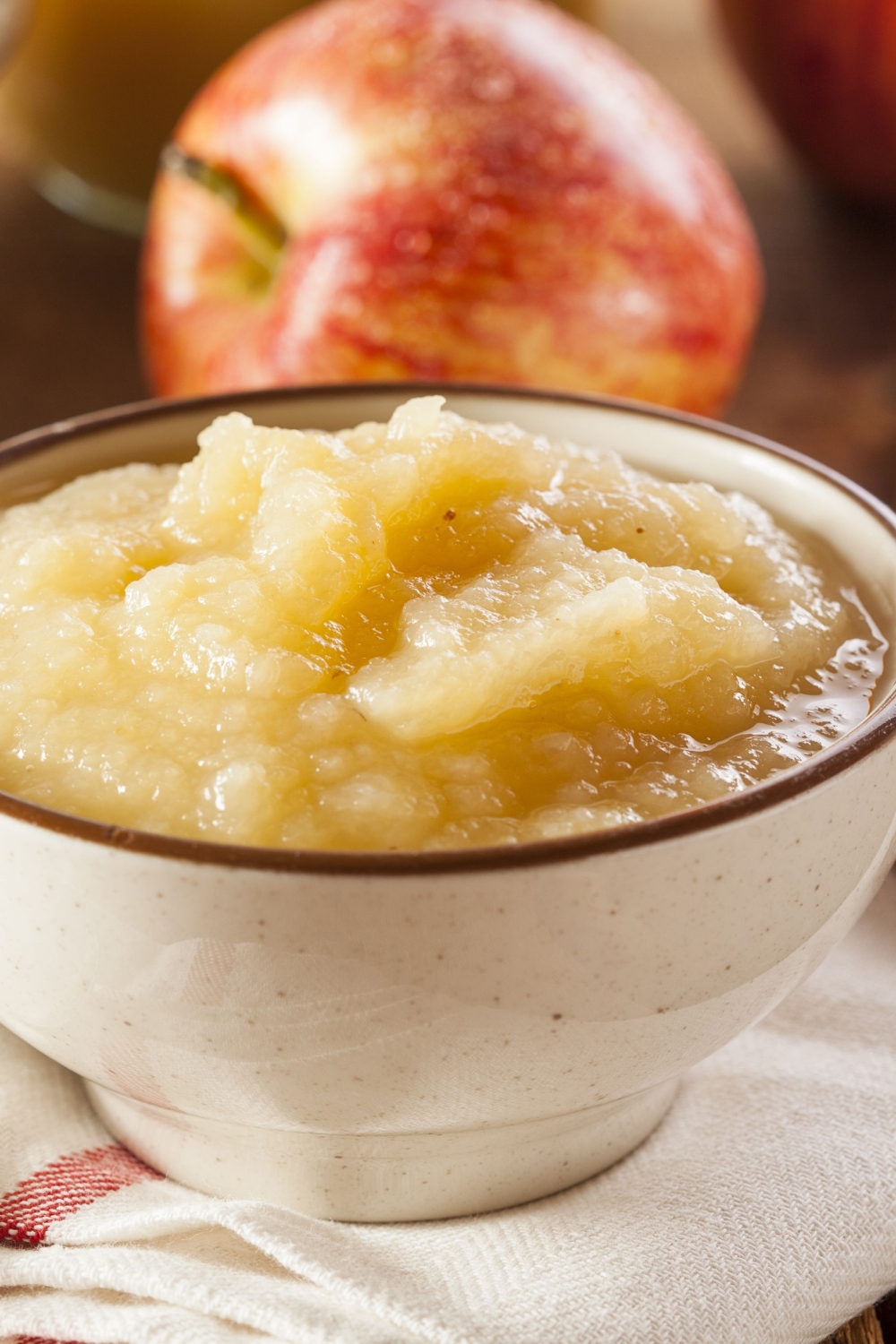
If you’ve ever been baking with bananas, you must know that applesauce can be a great substitute for banana in baking because of its binding qualities. The same goes for meatballs.
Pros:
• As you might have guessed, applesauce can add moisture to the meatball mixture and keep them tender and juicy during cooking.
• It can also add natural sweetness, which can enhance the flavor of the meatballs and provide a nice twist to the savory flavors of the seasonings and spices.
• Also, applesauce is a lower-calorie alternative to eggs and other fat-containing binders.
Cons:
• Although applesauce has binding properties, they are quite limited when compared with eggs and other traditional binders.
• Commercially available applesauce may vary in consistency from brand to brand. Some applesauce may be thinner or runnier, which can further affect the binding and texture of the meatballs.
• Depending on the recipe and individual taste preferences, using applesauce as an egg substitute may add additional sweetness to the meatballs, which can be undesirable if the dish is meant to be mostly savory.
How To Use As A Substitute:
Simply make the meatball mixture and, instead of using eggs, add applesauce to that same mixture.
The general rule of thumb is to use 3 tablespoons instead of one egg in the meatballs. If you are not a fan of the sweet flavor, rather use only 1-2 tablespoons.
Also, if you don’t want that sweet flavor at all, you can use unsweetened applesauce. In that case, 3 tablespoons will be ideal.
I also want to you to know that applesauce is one of the best sides for sandwiches.
8. Buttermilk
This ingredient can serve many culinary purposes, including marinating chicken in buttermilk, but also as a binding agent in meatballs.
Pros:
• The acidity of buttermilk can help tenderize the meat in the meatball mixture, and this can result in meatballs that are more tender and succulent when cooked.
• It also adds moisture and creaminess to your meatballs.
• Buttermilk is lower in fat than whole milk, which makes it a healthier option, especially for those of you who are on a low-fat diet.
Cons:
• Since buttermilk is highly acidic, it can provide your meatballs with some extra tanginess, which may not be liked by everyone.
• That same acidity can also make meatballs tender and soft, which can sometimes be a bad thing.
• Buttermilk’s binding properties might not be as strong as eggs, which could result in meatballs that are more delicate and prone to breaking apart during cooking.
How To Use As A Substitute:
The process of substitution is quite simple. Your task is to prepare the meatball mixture and, instead of eggs, add buttermilk.
Your best bet is to use 2 tablespoons of buttermilk instead of one egg in the recipe. If you don’t like the tanginess, you can lower the amount a little.
Buttermilk pairs especially well with turkey or chicken as it will keep these leaner meats more sumptuous.
9. Ricotta Cheese
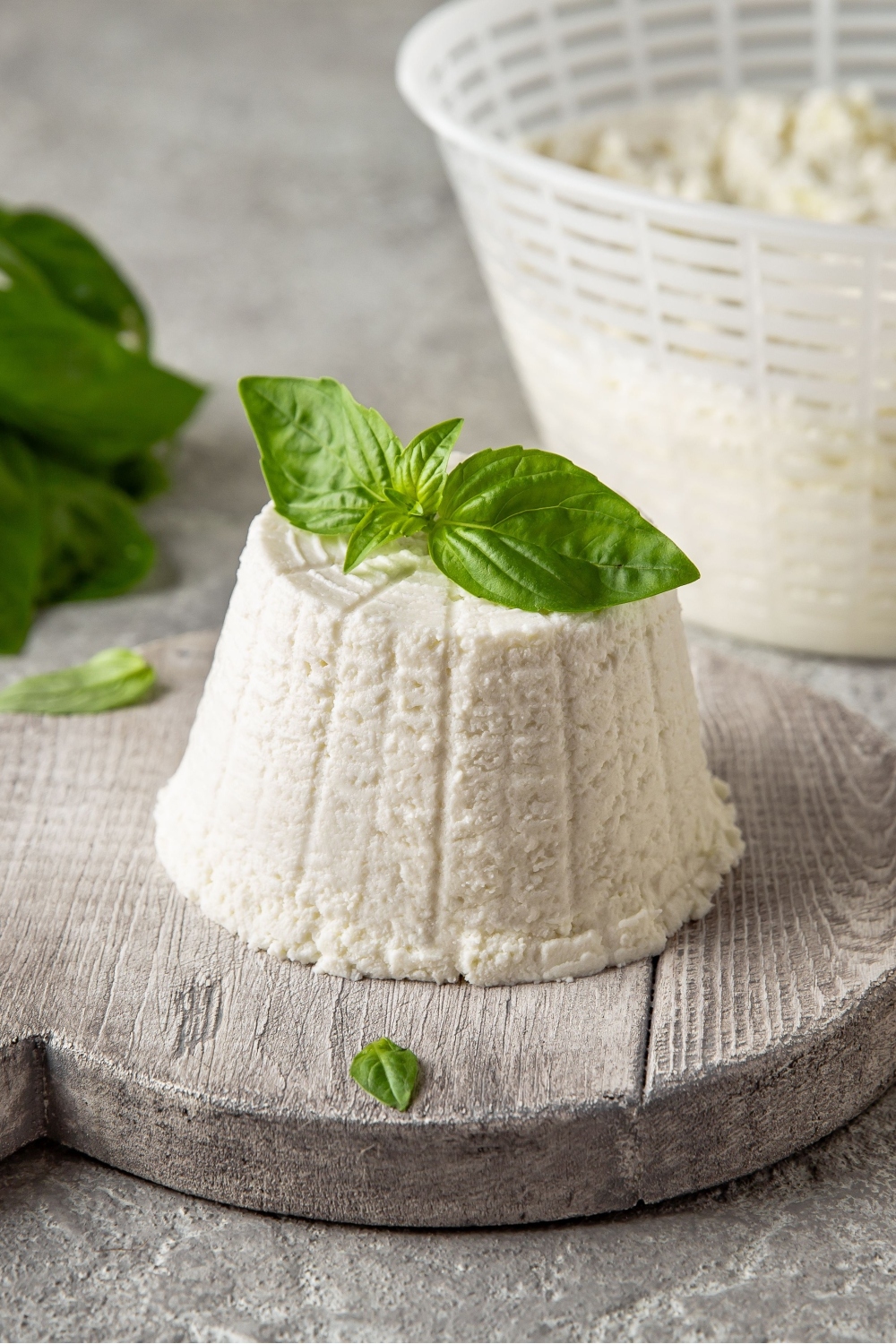
Recently, I wrote about ricotta cheese substitutes, and now I will say a few words about ricotta’s ability to substitute eggs in meatballs. This creamy, white, and slightly grainy cheese can perfectly add the needed moisture to your meatballs.
Pros:
• Like many other dietary products, ricotta cheese adds creaminess and moisture to the meatball mixture.
• Ricotta cheese has a relatively mild flavor, which is great because it won’t overpower the other ingredients in the mixture.
• This cheese is also a good source of protein and calcium, which are great for your health.
Cons:
• Ricotta cheese may not provide the same binding properties as eggs.
• Ricotta cheese has a very high moisture content, which could result in meatballs that are softer or more delicate.
• The texture of meatballs made with ricotta cheese may be slightly grainy due to the presence of curds in the cheese.
How To Use As A Substitute:
Using ricotta cheese as an egg substitute for meatballs is a straightforward process. You just need to make a meatball mixture and add ricotta cheese after that.
It is ideal to use ¼ cup of ricotta cheese to replace one egg.
Also, if your mixture is too moist, my recommendation is to add bread crumbs as they will absorb the moisture and balance out your meatballs.
10. Mayonnaise
And, finally, there is that one ingredient that you can use in almost every dish and you won’t go wrong. It is its majesty, mayonnaise, and it can be a decent alternative to eggs in meatballs.
Pros:
• Since mayonnaise contains a certain amount of eggs, it is no surprise that it has decent binding properties.
• Due to its flavor and consistency, mayonnaise adds creaminess and moisture to your meatballs.
• Using mayonnaise as an egg substitute is convenient as it eliminates the need to crack and beat eggs, making it a quick and easy option.
Cons:
• When you add mayonnaise, the meatballs may have a softer, more delicate texture, which could lead to a higher risk of them breaking apart during cooking.
• Mayonnaise is relatively high in fat, which could affect the overall fat content of the meatballs. For those of you seeking a lower-fat option, using mayonnaise might not be an ideal option.
• Due to its fat content, mayonnaise may have a risk of curdling or separating during the cooking process, especially at higher temperatures.
How To Use As A Substitute:
A great thing about using mayonnaise instead of eggs is that you can directly add it to your meatball mixture instead of cracking and beating eggs.
Just add 3 tablespoons of mayo to replace one egg and stir the mixture properly. After that, you can cook it.
I would recommend you monitor the texture and moisture content during the cooking process.
If you find that the meatballs are not holding together well, you may want to consider using additional binders like breadcrumbs or ground flaxseeds in future batches.
See Also: Can You Freeze Mayonnaise? One Tricky Question Indeed!


